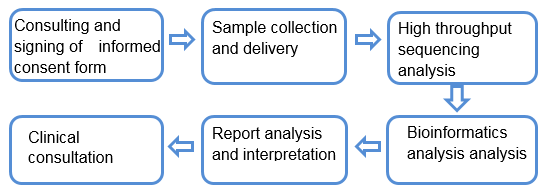Colorectal Cancer
- Overview
Colorectal cancer (CRC) is a common malignant tumor developed in the gastrointestinal tract. The incidence and mortality of colorectal cancer are on the rise, and most patients are diagnosed in the middle and late stage. Globally, the incidence of colorectal cancer ranks third among the incidence of all cancers, and colorectal cancer mortality ranks fourth among cancer-caused deaths.
Colorectal cancer gene detection is detection of colorectal cancer-related genes in samples of cancer tissue and peripheral blood through use of high-throughput sequencing platform. Through colorectal cancer gene detection, detection of genes associated with colorectal cancer and conventional chemotherapy for colorectal cancer and personalized medication guidance for patients can be achieved.
- The Necessity of Genetic Testing
KRAS genes will affect the efficacy of cetuximab and panitumumab. The effective rate of first-line treatment of wild-type KRAS gene colorectal cancer with cetuximab or Pani monoclonal antibody combined with chemotherapy is 41%~61%. But for KRAS gene mutation carrier, the effective rate is zero. Genetic detection of KRAS genes is an effective means of predicting the efficacy of targeted drugs for colorectal cancer. In addition, other gene mutations can also lead to resistance to targeted drugs in colorectal tumor. Appropriate medication is an important part of cancer treatment. Currently-used anti-tumor drugs have limited efficacy for more than 70% of patients. American Cancer Society estimates that more than 90% of patients died of varying degrees of tumor cell resistance.
According to the "Colorectal Cancer Diagnosis and Treatment Norms (2015 edition)" developed by National Health and Family Planning Commission, BRAF, KRAS, NRAS genes should be detected in pathologic assessment of colorectal cancer. The development of colorectal cancer is the result of interaction between multiple genes, multiple molecules and multiple pathways. Therefore, providing patients with guidance on molecular targeted therapy through the NGS multi-gene parallel detection is a key factor for achieving individualized treatment of colorectal cancer.
- Testing Content and Medication Guidance
Colorectal cancer is one of the malignant tumors that seriously threaten human life and health. In the treatment of colorectal cancer, in addition to the traditional surgery and radiotherapy and chemotherapy, molecular targeted therapy is also applied. Before clinical selection of appropriate targeted drugs, corresponding molecular target detection of tumor needs to be carried out. This test involves detection of important genes associated with colorectal cancer and is used to assess the sensitivity and drug resistance of targeted and chemotherapeutic drugs.
|
Part of the genes for detection |
APC ARIDIA ALK ARAF BRAF BRCA1 BRCA2 CDKN2A EGFR ERBB2 FGFR1 KRAS MAP2K1 MYC MET NRAS HER2 PIK3CA |
|
Part of the targeted drugs |
Pani monoclonal antibody, Cetuximab, Sunitinib, Vanderbilt, Reggie, Quimeitidine, Dalafini, Gefitinib,Carbotinib, Sertini, Sorafini, Everolimus, Imatinib |
|
Major manufacturers |
Roche Betta Pharmaceuticals Co., Ltd Pfizer Novartis GlaxoSmithKline |
|
Notes |
The drugs listed here include FDA/CDFA-approved drugs and clinical trial drugs |
- Applicable People
- Colorectal cancer patients who expect to adopt targeted drug therapy
- Colorectal cancer patients who wish to replace a poor therapy with an effective new one
- Colorectal cancer patients who need new therapy because of drug resistance, recurrence or metastasis of the cancer
- Clinical Significance
Genetic testing can help breast cancer patients select appropriate targeted drugs and can detect acquired drug resistance mutations.
- Sample Requirement
Fresh cancer tissue: ≥60mg
Fresh percutaneous biopsy tissue: 2~3 needles
Paraffin-embedded tissue: 8~10 paraffin embedded tissue sections
DNA: DNA:concentration≥30ng/μL, 260/280≈1.8~2.0,gDNA≥1ug,cfDNA≥500ng
Peripheral blood: 10mL fresh peripheral blood
- Service Process

